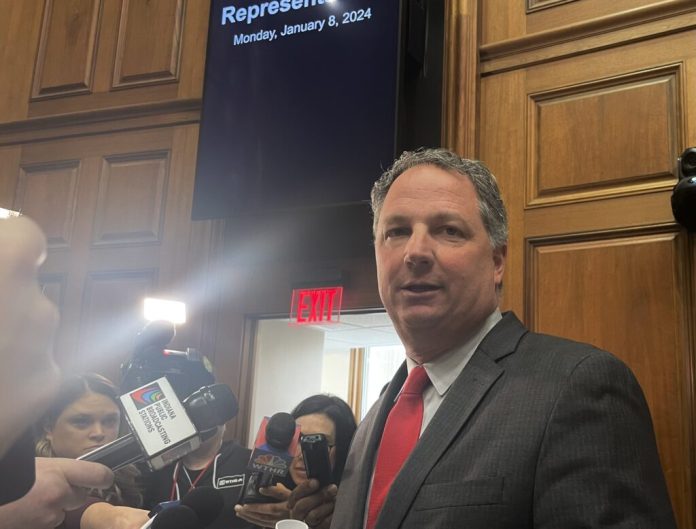
| Indiana Capital Chronicle
For The Republic
INDIANAPOLIS — Indiana’s House Republican caucus — 70 strong — will prioritize legislation boosting retirement benefits for public employees and banning antisemitism in public educational institutions, alongside bills on job training and administrative law.
Democrats, meanwhile, focused on accountability.
Conversations humming in the House Chamber on Monday quieted as Speaker Todd Huston stepped up to a lectern and gaveled the chamber’s 100 lawmakers into the de facto first day of session.
Huston said the caucus would again aim to give public retirees a benefit increase known as a 13th check, after the Senate skipped out on one last session — angering many.
“It’s been an important thing to our caucus and we wanted to pass it again this year,” Huston told reporters.
The check supplements benefits that generally don’t keep up with inflation. Lawmakers have traditionally offered former employees either a 13th check or cost of living adjustments during two-year budget cycles.

The House last year unanimously approved legislation obligating $37.8 million one year followed by $38.2 million the next to supplement retiree pay but it never got a hearing in the Senate.
Dedicated funding in a separate account already exists to cover the cost.
An interim study committee recommended that Indiana should move from ad hoc benefit increases to a long-term approach guaranteeing annual 13th checks for some and COLAs for others.
Huston said House Republicans would additionally champion legislation reaffirming the rights of Jewish students to receive an education free of religious discrimination.
Indiana law already bans discrimination on the basis of race and “creed,” which means religion. House Bill 1002 would specify that antisemitism — bias against Jewish people — is religious discrimination and is not allowed within the public education system.
The legislation uses a definition of antisemitism adopted by the U.S. State Department, U.S. Education Department and the International Holocaust Remembrance Alliance. And it makes clear that “criticism of Israel similar to that leveled against any other country” is not antisemitism.
Huston on Monday confirmed that support of Palestine — not the terrorist group Hamas — would not be considered antisemitism under the legislation.
The House unanimously approved an identically-worded bill last session, but it didn’t make it out of committee in the Senate and died.
“We’ll give it another shot to pass that again this year,” Huston said.
Democrats introduce priorities
Minority Leader Phil GiaQuinta agreed that lawmakers should send retirees a 13th check “instead of breaking this promise to them like we did last year.”
House Democrats laid out a pricer list of priorities: universal pre-kindergarten in hopes of boosting Indiana’s worsening reading proficiency rates, increasing Medicaid reimbursement rates, and offering more property tax relief to homeowners and renters.
GiaQuinta also said he wanted to “moderate” the controversial Indiana Economic Development Corp. (IEDC), a quasi-public agency.

He criticized the entity for not establishing “community trust” while embarking on a massive, water-intensive industrial development known as LEAP (Limitless Exploration/Advanced Pace).
“Understandably, many Tippecanoe County residents feel that the IEDC has little concern for their long-term water supply, and views their concerns as secondary to getting the LEAP project over the finish line,” GiaQuinta said. “Likewise, Terre Haute and other downstream communities have expressed concern about the project. These decisions only amplify citizen distrust in their government.”
“IEDC needs more transparency and oversight. The legislature has written IEDC far too many blank checks over the past few years. As my colleagues from Tippecanoe County have noted, we need to look before we leap,” GiaQuinta quipped, prompting quiet laughter from the chamber.
House Democrats additionally pushed for the state to adopt citizen-led ballot initiatives, which residents in states like Michigan, Ohio and Kansas have recently used to require independent redistricting, protect abortion access or authorize marijuana use.
“Voters … have weighed in loud and clear: Midwesterners don’t like the government telling them what to do,” GiaQuinta said. “I don’t know about you, but I have a strong suspicion that Hoosiers don’t like the government telling them what to do on abortion or marijuana either.”
The constitutional change would require multiple years of legislative approval plus a voter referendum.
Huston indicated that the idea is a non-starter: “We have elections every two years where people have a chance to vote and I think the way it works today has been successful for Indiana.”
Quiet day in the Senate

Across the hall, Chief Justice Loretta Rush swore in the Senate’s newest member: Dave Vinzant, a former Hobart councilman. He succeeds former Sen. Eddie Melton, who won the mayoral election in Gary.
Vinzant joins three other new senators: Indianapolis’ Cyndi Carrasco, Guildford’s Randy Maxwell and Terre Haute’s Greg Goode. Sen. Pro Tem Rodric Bray, R-Martinsville, welcomed the assembled senators for their first day — noting that the chamber already had a committee scheduled to meet Monday and were moving quickly.
“I’m grateful to be back and ready to get to work,” he said.
— The Indiana Capital Chronicle covers the state legislature and state government. For more, visit indianacapitalchronicle.com.




